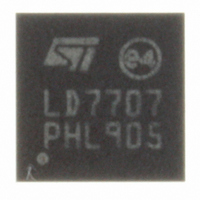LED7707TR STMicroelectronics, LED7707TR Datasheet - Page 26

LED7707TR
Manufacturer Part Number
LED7707TR
Description
IC LED DRIVR WHT BCKLT 24-VFQFPN
Manufacturer
STMicroelectronics
Type
Backlight, White LEDr
Datasheet
1.LED7707TR.pdf
(47 pages)
Specifications of LED7707TR
Topology
PWM, Step-Up (Boost)
Number Of Outputs
6
Internal Driver
Yes
Type - Primary
Backlight
Type - Secondary
White LED
Frequency
250kHz ~ 1MHz
Voltage - Supply
4.5 V ~ 36 V
Voltage - Output
36V
Mounting Type
Surface Mount
Package / Case
24-VFQFN, 24-VFQFPN
Operating Temperature
0°C ~ 85°C
Current - Output / Channel
85mA
Internal Switch(s)
Yes
High Level Output Current
85 mA
Operating Supply Voltage
4.5 V to 36 V
Maximum Supply Current
1 mA
Maximum Power Dissipation
2.3 W
Maximum Operating Temperature
+ 150 C
Mounting Style
SMD/SMT
Minimum Operating Temperature
- 40 C
For Use With
497-10044 - BOARD EVAL LCD BACKLIGHT LED7707
Lead Free Status / RoHS Status
Lead free / RoHS Compliant
Efficiency
-
Lead Free Status / Rohs Status
Details
Other names
497-8492-2
Available stocks
Company
Part Number
Manufacturer
Quantity
Price
Company:
Part Number:
LED7707TR
Manufacturer:
ST
Quantity:
12 000
Company:
Part Number:
LED7707TR
Manufacturer:
STMicroelectronics
Quantity:
10 000
Application information
26/47
Equation 13b
Where V
Note that, the lower the inductor value (and the higher the switching frequency), the higher
the bandwidth can be achieved. The output capacitor is directly involved in the loop of the
boost converter and must be large enough to avoid excessive output voltage drop in case of
a sudden line transition from the maximum to the minimum input voltages.
However a more significant requirement concerns the output voltage ripple.
The output capacitor should be chosen in accordance with the following expression:
Equation 14
where ΔV
inductor current, T
Section 6.4.4 on page 33
Once the output capacitor has been chosen, the R
Equation 15
Where GM = 2.7 S and g
Equation 15 places the loop bandwidth at f
place the frequency of the compensation zero 5 times lower than the loop bandwidth:
Equation 16
Where f
In most of the applications an experimental approach is also very valid to compensate the
circuit. A simple technique to optimize different applications is to choose C
and to replace R
transient response. Insufficient damping will result in excessive ringing at the output and
poor phase margin.
Figure 18
Z
IN,min
OUT, max
= f
(a and b) give an example of compensation adjustment for a typical application.
U
/5.
is the minimum input voltage and I
COMP
is the maximum acceptable output voltage ripple, I
OFF
is the off-time of the switching cycle (for an extensive explanation see
with a 10 kΩ trimmer adjusting its value to properly damp the output
).
EA
= 375 µS
C
OUT
C
R
COMP
COMP
>
(
I
R =
, L
=
=
peak
U
2
2
. Then, the C
G
⋅ π
Δ ⋅
V
I
2
OUT
M
OUT
−
⋅ π
V
f
Z
I
⋅
OUT
OUT
OUT
g
⋅
f
1
U
COMP
R
EA
,
⋅
COMP
max
)
is the overall output current.
C
⋅
⋅
T
M
OFF
can be calculated as:
COMP
capacitor is determined to
L, peak
COMP
is the peak
= 4.7 nF
LED7707





















